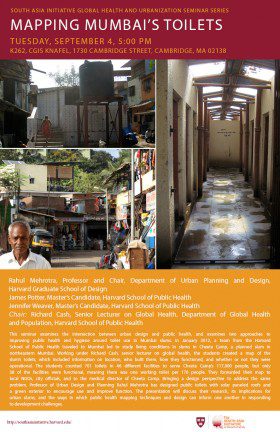Urbanization and Global Health Seminar Series:
 Students and faculty from the Harvard School of Public Health (HSPH) and Graduate School of Design (GSD) came together to address a common issue in slum dwelling—the scarcity and poor conditions of public toilets in urban slums in Mumbai—and to discuss sustainable solutions from design and public health.
Students and faculty from the Harvard School of Public Health (HSPH) and Graduate School of Design (GSD) came together to address a common issue in slum dwelling—the scarcity and poor conditions of public toilets in urban slums in Mumbai—and to discuss sustainable solutions from design and public health.
The desired ratio of number of toilets person by the Bombay Municipal Corporation is 1:50. The current BMC estimates are 1:500, which are even lower than the actual ratio, estimated at 1: 5000.
Public Health Perspective: Richard Cash and students from HSPH observed in their study of toilets in Cheeta Camp, Mumbai, that compounding the scarcity of the toilets in slum dwellings, 17% of public toilets in the camp were closed. Of the remaining functioning toilets, those that were pay-to-use toilets were in slightly better conditions than the free toilets. Students observed that beyond the public health concerns of infectious disease transmission (diarrhea, malaria, cholera) due to unhygienic living conditions, the functioning and availability of toilets in these areas were influenced by other factors such as politics around land ownership and availability and control of resources for construction and operating the facility.
Design Perspective: Rahul Mehrotra (GSD) shared his work on designing toilets in several slum locations in Mumbai. He is interested in how the design of toilets can impact issues of health. His designs focus on manipulating space in a densely populated, temporary collection of dwellings. With a combination of use of natural light and solar panels and local materials like bamboo and corrugated metal for the roof, his designs are intended to be responsive to the specific needs of the site, as well as inexpensive and sustainable. The structure is also intended to be a multifunctional space: toilets are on the lower level, while the caretaker’s living quarters are above, with a common space for a community center to be shared by the area residents in front.
The common challenge the presenters faced was that slum dwellings are usually both illegal and temporary. To make any kind of permanent structural change or to suggest use of space for planned activities threatens the transient and temporary location of the community, raising questions of ownership of unclaimed land: who owns it – the government, or those who have squatted there for generations? In needing to first address this question, governments, residents, and NGOs working to mediate the social issues affecting slum dwellers are unable to deal with the real issues of corruption and inefficiency. Support of the local government is crucial to address the real public health needs caused by the lack of functioning toilets urban slums in India.
Speakers included:
Rahul Mehrotra, Professor and Chair, Department of Urban Planning and Design, Harvard Graduate School of Design
James Potter, Master’s Candidate, Harvard School of Public Health
Jennifer Weaver, Master’s Candidate, Harvard School of Public Health
Chair: Richard Cash, Senior Lecturer on Global Health, Department of Global Health and Population, Harvard School of Public Health
Watch the video footage of the seminar here.
Global Health and Urbanization Seminar Series: Mapping Mumbai’s Toilets from South Asia Initiative on Vimeo.

